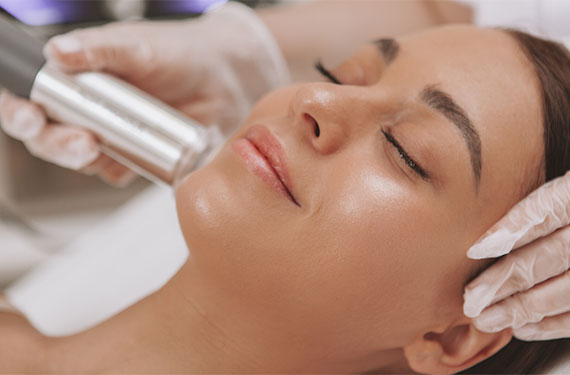Introduction
 Sensitive or reactive skin requires extra attention and care. Flare-ups, redness, stinging, and irritation can be triggered by anything—from harsh products and environmental stressors to certain professional treatments. But sensitive skin doesn’t mean you need to miss out on the benefits of advanced skincare.
Sensitive or reactive skin requires extra attention and care. Flare-ups, redness, stinging, and irritation can be triggered by anything—from harsh products and environmental stressors to certain professional treatments. But sensitive skin doesn’t mean you need to miss out on the benefits of advanced skincare.
With the right approach, professional guidance can help build a routine that calms, protects, and strengthens your skin barrier, while still allowing for targeted treatments like hydration facials or gentle peels.
Step 1: Start with a Gentle Foundation
For sensitive skin, less is often more. A minimalist routine helps avoid unnecessary irritation.
- Cleanser: Choose a sulfate-free, fragrance-free gentle cleanser.
- Moisturizer: Opt for barrier-repairing creams with ceramides or panthenol.
- Sunscreen: Mineral sunscreens (zinc oxide, titanium dioxide) are less irritating than chemical filters.
Pro Tip: Always introduce one product at a time to track reactions.
Step 2: Patch Testing Is Non-Negotiable
Before adding new serums or treatments, patch test on a small area of skin (such as behind the ear or inner arm) for 24–48 hours.
- This helps detect possible irritation before applying to the entire face.
- Especially important after procedures like microneedling or chemical peels when skin is more vulnerable.
Step 3: Ingredients That Love Sensitive Skin
Not all actives are off-limits—some are actually beneficial for calming irritation:
- Niacinamide: Strengthens the skin barrier and reduces redness.
- Centella Asiatica (Cica): Known for soothing and healing properties.
- Panthenol (Vitamin B5): Deeply hydrating and calming.
- Hyaluronic Acid: Restores moisture without irritation.
Avoid: Strong acids (AHAs/BHAs), high-strength retinoids, artificial fragrances, and alcohol-based toners.
Step 4: Professional Treatments for Sensitive Skin
At RxRejuvenate, treatments are carefully adapted for reactive skin. Safe options may include:
- Hydration facials with calming serums
- LED light therapy (red or yellow light) to reduce inflammation
- Mild enzymatic peels instead of harsh chemical exfoliation
Pro Tip: A professional consultation ensures that treatments are customized to your unique skin triggers.
Step 5: Lifestyle Habits That Support Sensitive Skin
- Protect against extreme weather (scarves in winter, hats in summer).
- Maintain good stress management, since stress hormones can trigger flare-ups.
- Stick to a consistent routine—frequent product changes can destabilize sensitive skin.
Final Thoughts
 Caring for sensitive or reactive skin is all about strengthening the barrier, minimizing triggers, and choosing the right calming ingredients. With expert guidance, it’s possible to design a routine that not only prevents irritation but also enhances the benefits of professional treatments.
Caring for sensitive or reactive skin is all about strengthening the barrier, minimizing triggers, and choosing the right calming ingredients. With expert guidance, it’s possible to design a routine that not only prevents irritation but also enhances the benefits of professional treatments.

